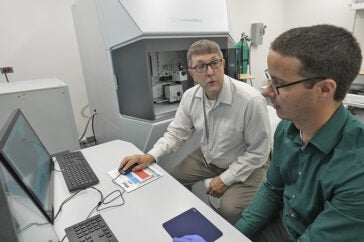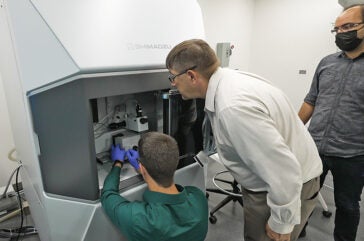
By Neil Nachbar
As an electrical materials research engineer at the University of Rhode Island, there’s no such thing as a typical day for Michael Platek.
Platek is responsible for making sure some of the most sophisticated and expensive research equipment housed in the Shimadzu Engineering Research Core Facility on the bottom floor of the Fascetelli Center For Advanced Engineering works properly.
However, maintaining state-of-the-art devices isn’t Platek’s only responsibility.
“My day starts with making sure the equipment in the lab is running properly,” said Platek. “I check in with the graduate students to see if they have any questions about the equipment. I’ll handle calls from local companies about helping them conduct failure analysis or quality control tests on their samples. I support the faculty with their research equipment needs, which keeps me on my toes. And if one of the instruments goes down, I become the ‘Maytag’ repairman and fix it.”
Platek was hired by the Electrical Engineering Department at URI in 1990 to support the materials research efforts of the department, provide teaching support for the electrical materials and fiber optics courses, along with other support services for the department.

Over time, the professors with whom Platek first worked retired, new equipment was purchased, and the College created a cost center for those outside of URI who wanted to take advantage of the unique equipment.
“We established one of the first cost centers for the College of Engineering,” said Platek, who lives in Woonsocket with his wife Mimi. “I do analysis for outside companies, which generates revenue that is needed to maintain the instruments.”
One of the newest instruments Platek oversees is a $1.3 million electron probe microanalyzer. This specific model, which is made by Shimadzu, is the only one of its kind in the United States.
“Shimadzu provides five years of maintenance and service, but my concern is what happens after the five years,” said Platek. “Using the equipment is fun and exciting but worrying if something breaks and who pays for the repair is what gives me gray hair, along with having four kids.”
When Platek isn’t in the lab, he’s teaching two engineering courses at URI, Foundations of Engineering, and Passive and Active Circuits.
“Teaching undergraduates is a new, fun challenge,” said Platek, who has a bachelor’s degree in physics from Indiana University in Pennsylvania and a master’s degree in physics from Wesleyan University in Middletown, Connecticut.
When he’s not at work, Platek enjoys spending time at the cabin he built in Maine or fishing along the Rhode Island shoreline.
